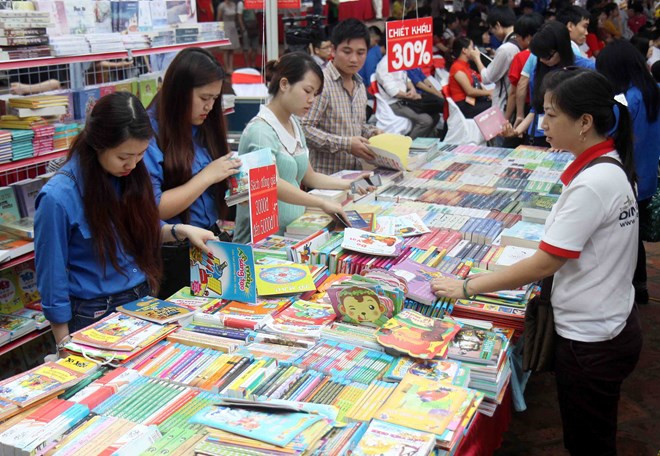Developing a reading culture: Not just relying on book festivals
To arouse and maintain the passion for reading, develop a reading culture and to make the organization of the annual book festival in Hanoi more effective, many experts in the cultural field believe that the organization of the book festival should be concentrated in one location and there should be regular activities to maintain the "heat" of the book festival.
 |
| A large number of readers came to the Book Festival - Reading Culture 2014. Photo: VNA |
Location focus and object classification
According to Decision 284/QD-TTg of the Prime Minister, April 21 is chosen as Vietnam Book Day every year. This year, the first Vietnam Book Day was held from April 19-21, 2014 nationwide; in which, the main activities took place in the capital Hanoi.
Besides the two main locations, the National Library and the Temple of Literature, many activities to celebrate the first Vietnamese Book Day were also held at other locations in Hanoi such as the Women's Museum, the East-West Cultural and Language Center, etc.
However, according to Mr. Nguyen Kiem - Vice President of Vietnam Publishing Association, when there is an official decision on Vietnam Book Day, the organization of the book festival should be concentrated at one location.
“Concentrating activities in one location will create an overall space for the public to experience many different activities without spending much time traveling,” Mr. Kiem expressed.
Sharing the same view, Associate Professor - Doctor Nguyen Thi Minh Thai (University of Social Sciences and Humanities - Vietnam National University, Hanoi) said that activities of Vietnam Book Day should be organized at the Temple of Literature - Quoc Tu Giam because this is the first university in our country.
“This is very meaningful in honoring the nation's tradition of studiousness,” Ms. Thai shared.
In addition, this expert believes that in the first years of organizing Vietnam Book Day, the organizing committee should classify the target groups coming to the space to organize the book festival and focus first on university and college students. This priority should be concretized into activities such as introducing types of books as tools for research and study; discussing effective reading methods, etc.
“We still talk about organizing book festivals to save the reading culture, but the specific problem is how to save it? The biggest ‘tragedy’ of readers is not being able to ‘understand’ the words when reading. If the reading culture among students is not saved, the immediate consequences are not difficult to imagine: Generations of students graduating will find it difficult to find decent jobs,” Ms. Thai expressed.
Analyzing this issue in more detail, Associate Professor, Doctor Nguyen Thi Minh Thai said: Currently, according to statistics from the Ministry of Information and Communications, the Ministry of Culture, Sports and Tourism, the average book reading rate of Vietnamese people is 0.8 books/person/year. With this situation, organizing a book festival in a limited time will not be able to change the awareness and reading habits of the whole society.
“Therefore, it is important to identify priority groups to have appropriate action programs and avoid spreading activities like the current ones; thereby, creating a ripple effect in the community,” said Ms. Thai.
“Keep the fire burning”
According to Mr. Nguyen Kiem, choosing April 21 every year as Vietnam Book Day is an important milestone in the development of reading culture in Vietnam, contributing to promoting social awareness of the role of books and reading.
“This is an important premise. However, for this meaning to be truly promoted, we need to have continuous activities, not just stopping at organizing an annual book festival and hoping that this will change the reading habit that has been neglected over the past time,” Mr. Kiem expressed.
Specifically, Mr. Kiem said that each family should build a family bookshelf, and schools should form reading clubs to promote and create reading habits for young children.
“Parents need to create a reading habit for their children from an early age. We are not building something new but awakening the nation’s love of reading. Moreover, this also creates a foundation for Vietnamese citizens to participate in global activities with a constantly updated source of knowledge,” Mr. Kiem shared.
Sharing the same view, history professor Le Van Lan also believes that the development of reading culture needs to be nurtured regularly in addition to organizing annual book festivals as a peak activity. “Maintaining the heat of book festivals is an important requirement; it should not be like a flame that flares up for a few days and then dies down,” the professor shared.
Specifically, according to Professor Le Van Lan, Hanoi should have a well-planned book street like Ho Chi Minh City has Nguyen Hue and Mac Thi Buoi book streets... "Let's build a book street as a regular cultural meeting place with book exchange activities," Professor Le Van Lan expressed.
He believes that Hanoi is the “heart” of the whole country. When Hanoi builds a widespread reading movement, it will have a great influence on other localities.
According to Vietnam+
